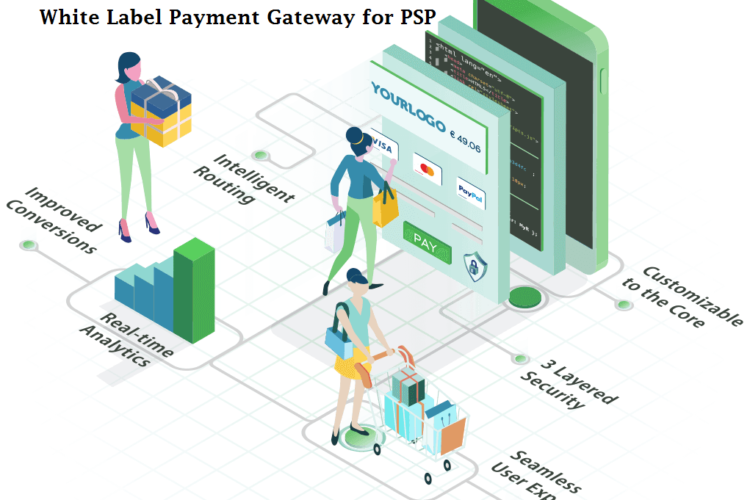Over the years, the banking industry has undergone significant changes, with the rise of fintech and digital technologies leading to increased competition and innovation. One of the most exciting developments in recent years has been the emergence of white label payment platforms, which have the potential to revolutionize the banking system as we know it. These platforms offer a range of benefits, from greater flexibility and customization to faster implementation and innovative features.
In this article, we explore how white label payment platforms are transforming the banking industry and how to speed software development.
What is a white-label payment system?

Source: paycaps.com
This is a payment processing solution that is developed and managed by a third-party provider, but can be branded and customized to appear as if it is the business’s own payment system. Essentially, it is a turnkey solution that enables businesses to accept payments under their own branding, without having to build or maintain their own payment infrastructure.
With a white label payment system, a business can offer a seamless payment experience to their customers, with the payment page or interface appearing as if it is part of the business’s own website or app. The white label provider handles the processing and security of the payment, while the business can focus on other aspects of their operations.
This software can offer a range of payment methods, such as credit and debit cards, e-wallets, bank transfers, and more. They can also offer additional features, such as fraud prevention tools, analytics, and reporting.
White-label payment programs can be an attractive option for businesses that want to offer a branded payment solution to their customers, without investing in the development and maintenance of their own payment infrastructure.
How can a white-label payment platform can help to build a digital retail bank?

Source: advapay.eu
A white-label payment platform is a software solution that can be customized and branded by financial companies, including digital retail banks, to provide a range of payment processing services. These platforms offer several benefits that can help build a digital retail bank. Here are some of the key advantages:
Enhanced customer experience
It can provide a seamless payment experience for customers by offering a variety of payment methods, including card, mobile payments, and bank transfers. Customers can conduct transactions from their preferred device or location, making it convenient and accessible for them.
Easy integration
Payment Platform can easily integrate with other third-party services such as fraud prevention, risk management, and compliance services. This ensures that digital retail banks can offer a comprehensive and secure platform for their customers.
Cost savings
Building a payment platform from scratch can be expensive and time-consuming. A white-label payment platform can provide a ready-made solution that can be deployed quickly and at a lower cost. This allows digital retail banks to focus on other areas of their business such as customer acquisition and marketing.
Customization
A white-label software can be customized to fit the specific needs of digital retail banks. The platform can be branded with the bank’s logo and color scheme, providing a consistent user experience across all channels. Banks can also tailor the platform’s features and functionality to meet their specific requirements.
Scalability
A white-label payment platform is built to handle a high volume of transactions, ensuring that digital retail banks can handle increasing demand without compromising on performance. The platform can also be easily scaled up or down depending on business needs, making it a flexible solution for digital retail banks.
It can help build a digital retail bank by providing enhanced customer experience, easy integration, cost savings, customization, and scalability. By partnering with a trusted payment platform provider, digital retail banks can offer a reliable and secure platform for their customers to conduct transactions conveniently and efficiently.
Software solution for building a digital retail bank

Source: techfunnel.com
The SDK.finance company provides a white-label payment platform that can be customized for different financial companies such as digital retail banks and other fintech companies. The platform provides a range of payment services including account management, bill payments, transactions and reporting. The system is built using cutting-edge technologies and API-first approach, which provides scalability, flexibility, and easy integration with other third-party services.
This platform takes a customer-centric approach and provides the necessary features to ensure the success of your neobank and make it the primary hub for all your clients’ banking needs:
- Multi-currency accounts
- Currency exchange
- Spending visualization
- Visa/MasterCard issuing
- Popular payments
- P2P money transfers
By using this payment platform you can quickly launch a digital retail bank without starting from scratch. This fintech software can save time and resources and also provide a secure and reliable platform for customers to conduct their financial activities.
Our platform is a powerful solution for payment companies that help to develop a digital retail platform or improve their existing system.
Conclusion
White-label payment platforms are transforming the banking industry by offering a range of benefits, from flexibility and customization to faster implementation and innovative features. They provide a cost-effective and reliable solution for businesses looking to offer a seamless payment experience to their customers.
With this software platform, financial companies, including digital retail banks, can quickly and easily launch a customized payment solution that provides enhanced customer experience, easy integration, cost savings, customization, and scalability. By leveraging the power of white-label payment platforms, businesses can focus on other aspects of their operations while providing a secure and reliable payment solution to the customers.




